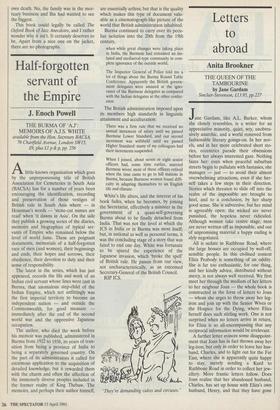Half-forgotten servant of the Empire
J. Enoch Powell
THE BURMA OF `AS: MEMOIRS OF A.J.S. WHITE available from the Hon. Secretary BACSA,
76 Chart, Avenue, London SW15, £9, plus £1 p & p, pp. 256 Alittle-known organisation which goes by the unprepossessing title of British Association for Cemeteries in South Asia (BACSA) has for a number of years been encouraging the identification, recording and preservation of those vestiges of British rule in South Asia where — in Housman's words — 'stone-cut names are read' when 'it dawns in Asia'. On the side they publish a growing series of the diaries, memoirs and biographies of typical ser- vants of Empire who remained below the level of world fame. These are poignant documents, memorials of a half-forgotten race of men (and women), their beginnings and ends, their hopes and sorrows, their obedience, their devotion to duty and their sense of responsibility.
The latest in the series, which has just appeared, records the life and work of an Indian civil servant whose lines were cast in Burma, that anomalous step-child of the Indian Empire, which not unfittingly was the first imperial territory to become an independent nation — and outside the Commonwealth, for good measure immediately after the end of the second world war and the oppressive Japanese occupation.
The author, who died the week before his memoir was published, administered in Burma from 1922 to 1938, its years of tran- sition from being a province of India to being a separately governed country. On the part of its administrators it called for enormous application to the acquisition of detailed knowledge; but it rewarded them with the charm and often the affection of the immensely diverse peoples included in the former realm of King Thebaw. The memoirs, and perhaps their author himself, are essentially artless; but that is the quality which makes this type of document valu- able as a cinematograph-like picture of the world that British administration inhabited.
Burma continued to carry over its pecu- liar isolation into the 20th from the 19th century,
when while great changes were taking place in India, the Burmese had remained an iso- lated and mediaeval-type community in com- plete ignorance of the outside world.
The Inspector General of Police told me a lot of things about the Burma Round Table Conference. Apparently the British govern- ment delegates were amazed at the igno- rance of the Burmese delegates as compared with the Indian delegates at the other confer- ence.
The British administration imposed upon its members high standards in linguistic attainment and acculturation:
There was a firm rule that we received no annual increment of salary until we passed Burmese Lower Standard, and our second increment was withheld until we passed Higher Standard: many of my colleagues had their increments suspended.
When I joined, about seven or eight senior officers had, some time earlier, married Burmese wives: most of these officers retired when the time came to go to hill stations in Burma, because Burmese women found diffi- culty in adapting themselves to an English life and climate.
White's life alters, and the interest of his book fades, when he becomes, by joining the Secretariat, effectively a minister in the government of a quasi-self-governing Burma about to be finally detached from India. That was not the level at which the ICS in India or in Burma was most itself; but, in national as well as personal terms, it was the concluding stage of a story that was fated to end one day. White was fortunate to be spared the experience of the Japanese invasion, which 'broke the spell' of British rule. He passes from our view, not uncharacteristically, as an esteemed Secretary-General of the British Council.
RIP ICS.
`They're demanding cakes and circuses.'


























































 Previous page
Previous page